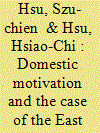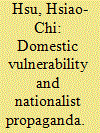| Srl | Item |
| 1 |
ID:
154652


|
|
|
|
|
| Summary/Abstract |
China's declaration of an air defense identification zone (ADIZ) in the East China Sea shocked the international community, and many explanations have been offered about the motivation behind it. We argue that domestic politics played a key role in the ADIZ policy. However, existing studies have not paid sufficient attention to decisionmakers' political motivation. To fill this gap, we explore two distinct models: the diversionary foreign policy model and the mobilization model. Both models focus on the linkage between the state leader's domestic political consideration and foreign policy behavior, but each has different theoretical and empirical implications. Our findings suggest that the mobilization model offers a better explanation of the motivation for China's move.
|
|
|
|
|
|
|
|
|
|
|
|
|
|
|
|
| 2 |
ID:
106245


|
|
|
|
|
| Publication |
2011.
|
| Summary/Abstract |
In early 2006, President Chen Shui-bian of Taiwan surprised domestic and international audiences by announcing his intention to scrap the symbolically important National Unification Council (NUC) and the Guidelines for National Unification (GNU). This announcement not only invited strong criticism from Beijing, but also seriously strained U.S.-Taiwan relations, because it was a clear violation of Chen's 2000 inaugural pledge regarding cross-Strait policy. This policy proposal presented an important theoretical challenge to the broadly recognized election cycle model in Taiwan's mainland policymaking- unlike Chen's earlier nationalist propaganda, the NUC initiative came after instead of during a major election campaign. To address this anomaly, this paper argues that while domestic politics play a key role in Taiwan's mainland policymaking, gaining votes is not the state leader's only concern. A careful examination of the political context shows that Chen's NUC campaign was used to divert attention from his personal political crisis following on his loss of both control over policy and leadership over his party after the DPP's poor showing in the December 2005 elections for city mayors and county magistrates.
|
|
|
|
|
|
|
|
|
|
|
|
|
|
|
|